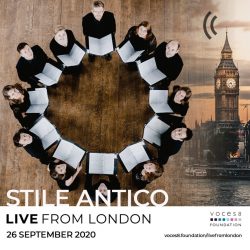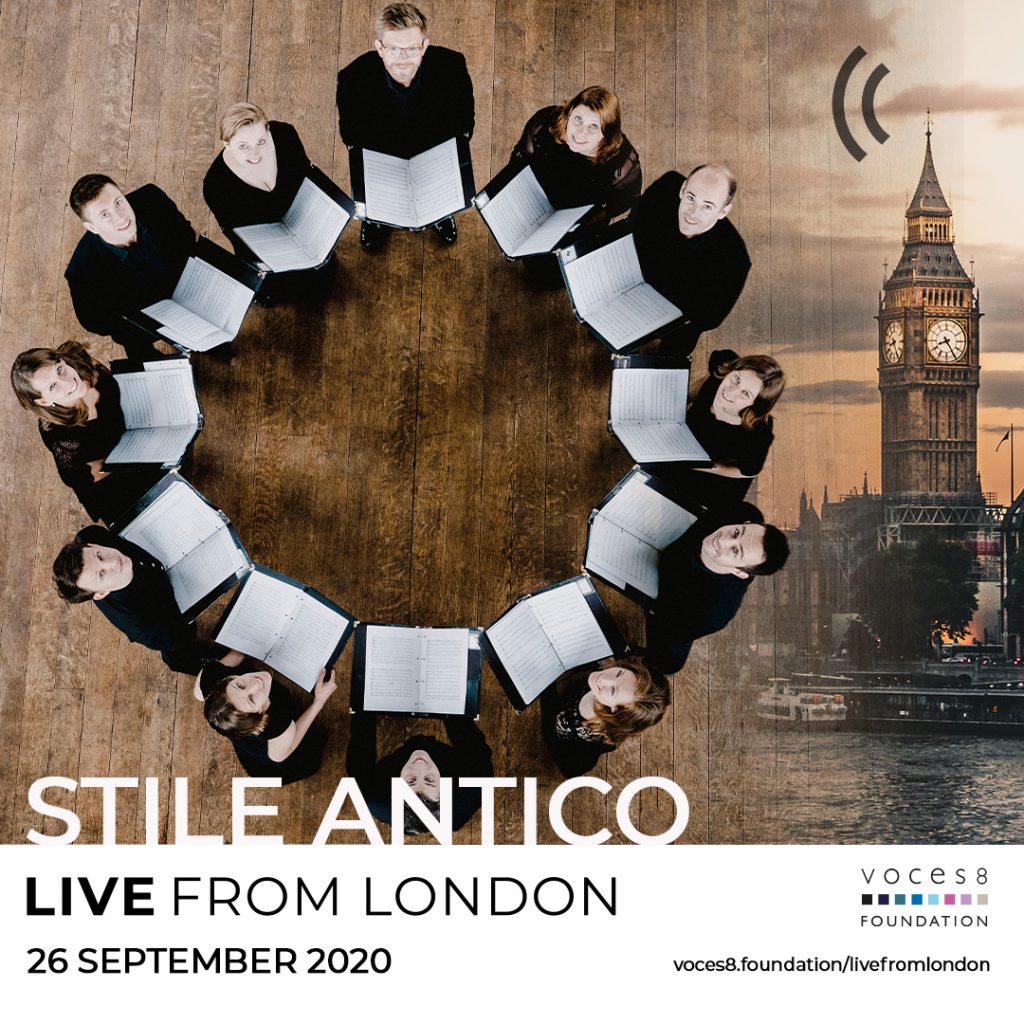 United Kingdom Live from London – Treasures of the English Renaissance: Stile Antico. Streamed as live from London’s VOCES8 Foundation, 26.9.2020. (CC)
United Kingdom Live from London – Treasures of the English Renaissance: Stile Antico. Streamed as live from London’s VOCES8 Foundation, 26.9.2020. (CC)

Tomkins – ‘Praise Ye the Lord’
Sheppard – ‘The Lord’s Prayer’
Gibbons – ‘O Clap Your Hands’
Phillips – ‘Gaude Maria Virgo’
Dering – ‘Factum est Silentium’
Tallis – ‘In Ieunio et fletu’
Byrd – ‘Vigilate’
Sheppard – ‘Gaude, Gaude, Gaude Maria’
Campion – ‘Never Weather Beat’n Sail’
For its concert, the British award-winning twelve-strong vocal group Stile Antico presented a miraculous celebration of choral music of the English Renaissance. The group has no conductor and here they sang in a circle, maximising visibility and eye contact between singers (often they sing in a semicircle, but social distancing meant they sang in the round).
The joys of the English Renaissance were heard in this pre-recorded performance from Stile Antico. The glorious ‘O Praise the Lord’ by Thomas Tomkins was a bright, active start to the evening. Sheppard’s ‘The Lord’s Prayer’ reflects a time of the Protestant emphasis on the devout setting of text; the florid lines of the Tomkins are replaced by concentrated expression. The slow unveiling of the Lord’s Prayer text (not identical to that which many know today: this is early in the prayer’s history) was positively hypnotic. The music of John Sheppard deserves yet more attention, despite the recorded efforts of Harry Christopher’s The Sixteen on Hyperion and the Tallis Scholars and Peter Phillips on Gimmell. This is glorious music, performed here to the highest standard; the balancing of texture was spectacularly managed. And what a glorious suspension Sheppard provides on the final cadence!
Far more famous is Orlando Gibbons’s ‘O Clap Your Hands’, a veritable celebration of joy with a beautifully bright close. The next four composers were all Catholic; both Phillips and Dering emigrated to the Low Countries to practise their religion freely. Peter Phillips’s ‘Gaude Maria Virgo’ does have a conservative aspect to its writing, exuding a quiet faith. (There has been conjecture this piece is instead by Morley: see Lionel Pike’s article in Music & Letters Vol.50 No.1, for example.)
Richard Dering’s Michaelmas motet ‘Factum est Silentium’ is probably that composer’s best known work, Italianate in its ornate writing and highly dramatic, as befits its text (which describes a war in Heaven as related in Revelations from the Christian Bible). Tallis’s ‘In ieunio et fletu’ offers significant contrast, a Penitential text for an SAATB group, putting significant emphasis on the alto register downwards. It also contains some harmonic clashes that, to work, require pinpoint tuning to have maximal Affekt. Here the effect was to stop time, the deep (and here, laudably firm) bass grounding the slowly evolving lines above. Very possibly from early in his creative life, Byrd’s ‘Vigilate’ is remarkable not only in its internal life but in its depictions of a cock crowing.
Taking advantage of the country’s reversion to Catholicism, Sheppard’s ‘Gaude, Gaude, Gaude Maria’ was written during the reign of Mary I after the strictures of the Protestant, musically austere time of Mary’s predecessor, Edward VI. The extended piece offers astonishing variety, including plainchant (delivered by Stile Antico with astonishing concentration). The purity of the upper voices here makes for real impact, too, but the most important aspect of this performance is its unhurried nature. The music seems to evolve organically, revelling in the independence of lines.
The Thomas Campion ‘Never Weather Beat’n Sail’ acted as a sort of encore, its chordal basis perfectly realised, infinitely warming and reassuring (Parry set this text, too, as we heard in the VOCES8 concert on 1 August (click here).
No complaints on the musical front at all, and fascinating to see Stile Antico at work and ‘in formation’. Some of the connecting narrations could have been delivered at a slower pace as they came across rather gabbled. But the music is what is important, and it was ravishing.
Colin Clarke
